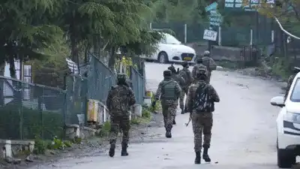The Shadow of Pahalgam: Escalating India-Pakistan Tensions in the Wake of Terror
The serene valleys of Kashmir, often hailed as paradise on Earth, have once again become a flashpoint in the volatile relationship between India and Pakistan. The horrific terror attack in Pahalgam, which claimed the lives of 26 tourists, has triggered a swift and assertive response from India, escalating already strained bilateral tensions. India’s retaliatory measures, including the reported suspension of the Indus Waters Treaty and the downsizing of the Pakistani embassy, have been met with strong condemnation from Pakistan, which is convening its National Security Committee and planning a missile test in the Arabian Sea. This dangerous tit-for-tat escalation underscores the fragility of peace in the region and the profound impact of terrorism on the complex dynamics between these nuclear-armed neighbors.

The Pahalgam Attack: A Catalyst for Retaliation
The brutal attack on tourists in Pahalgam sent shockwaves across India, igniting public outrage and demands for decisive action. The loss of innocent lives, including foreign nationals, amplified the sense of national grief and anger. In the aftermath, India swiftly pointed fingers towards Pakistan, alleging cross-border links to the perpetrators, despite a relatively unknown group claiming responsibility. This accusation, a familiar narrative in the context of Kashmir’s long history of militancy, provided the justification for India’s strong diplomatic and strategic response. The attack served as a stark reminder of the persistent threat of terrorism in the region and the enduring mistrust that defines India-Pakistan relations.
India’s Diplomatic Offensive: Suspending Treaties and Downgrading Ties
India’s immediate reaction went beyond condemnation, manifesting in concrete diplomatic actions aimed at signaling its resolve and exerting pressure on Pakistan. The reported suspension of the Indus Waters Treaty, a decades-old agreement governing the sharing of vital water resources, is a particularly significant move. This treaty, brokered by the World Bank, has historically been a rare instance of cooperation between the two nations, surviving numerous conflicts. Its suspension, even if temporary, carries the potential for severe consequences, particularly for Pakistan’s agricultural sector, which heavily relies on the Indus River system. Simultaneously, India’s decision to downsize the Pakistani embassy, including the expulsion of diplomats, further isolates Pakistan diplomatically and signals a significant cooling of bilateral relations. These measures collectively represent a sharp departure from routine diplomatic engagement and underscore India’s hardening stance.
Pakistan’s Counter-Response: Defiance and Strategic Signaling
Pakistan’s reaction to India’s measures has been one of strong condemnation and a display of strategic resolve. The convening of the National Security Committee signifies the gravity with which Islamabad views the escalating tensions. The planned missile test in the Arabian Sea can be interpreted as a direct signal of Pakistan’s military preparedness and its unwillingness to be cowed by India’s actions. This move, while framed as a demonstration of defensive capabilities, inevitably adds another layer of risk and mistrust to the already charged atmosphere. Furthermore, Pakistan’s strong rhetoric, potentially including the assertion that the suspension of the Indus Waters Treaty could be considered an “act of war,” highlights the deep sensitivity surrounding water security and the potential for further escalation.
The Perils of Escalation: A Region on Edge
The current standoff between India and Pakistan following the Pahalgam attack underscores the precarious security situation in South Asia. The rapid sequence of retaliatory measures and counter-responses raises serious concerns about the potential for unintended escalation. The suspension of crucial agreements and the heightened military posturing create an environment of increased risk and miscalculation. The international community watches with apprehension as two nuclear-armed states engage in a dangerous cycle of brinkmanship. De-escalation and a return to dialogue are crucial to prevent further deterioration of relations and to address the underlying issues that continue to fuel tension and violence in the region.
Navigating a Precarious Path
The aftermath of the Pahalgam terror attack has plunged India-Pakistan relations into a new phase of heightened tension and mistrust. India’s assertive diplomatic and strategic responses, met with defiance and strategic signaling from Pakistan, paint a grim picture of the immediate future. The social significance of this escalating crisis lies in its potential to destabilize the region, undermine any prospects for peace, and further entrench the cycle of violence and animosity. As both nations navigate this precarious path, the need for restraint, responsible leadership, and a renewed commitment to dialogue becomes more critical than ever to prevent the shadow of Pahalgam from engulfing the entire subcontinent in a deeper and more dangerous conflict.











